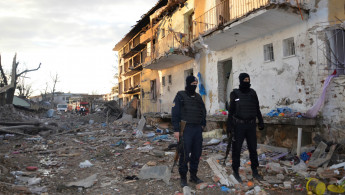Three children among dead following Kurdish bombing in Turkey
Six people were killed, including three children, and 39 wounded on Thursday in a car bomb attack blamed on Kurdish militants that ripped through a police station and an adjacent housing complex for officers' families in southeastern Turkey.
Two civilians were killed in the first bombing by the Kurdistan Workers' Party (PKK) in the town of Cinar and three more lost their lives when a building collapsed after the blast, the governor's office of Diyarbakir province said in a statement.
One policeman was also killed, Prime Minister Ahmet Davutoglu. "I vehemently condemn the attack," he added.
Security sources said the victims killed in the attack included a five-month-old baby, a boy aged five, and a girl aged one.
The governor's office said 14 people were injured in the initial bomb blast while 25 were wounded by the building's collapse, including five who had been rescued from the rubble by emergency teams.
The attackers also followed up the car bomb attack with rocket fire and long-range gunfire, reports said.
The Dogan news agency said a 40-minute clash then ensued between security forces and the rebels.
Security forces have now blocked all entrances and exits to Cinar and have launched a wide operation to find the assailants, it added.
Months of violence in southeast
The violence comes after ten German tourists were killed on Tuesday in a suicide bombing in central Istanbul which the government blamed on the Islamic State group - an arch foe of the PKK and its Syrian affiliate the YPG.
The PKK launched a formal insurgency against the Turkish state in 1984, initially fighting for Kurdish independence although it now presses more for greater autonomy and rights for the country's largest ethnic minority.
The conflict has left tens of thousands dead.
A new upsurge of violence between the security forces and the PKK erupted in July following attacks blamed on Islamic extremists, shattering a fragile two-and-a-half-year truce.
Vowing to flush out the PKK from Turkey's urban centres, the authorities have in recent weeks enforced curfews in three locations in the southeast to back up military operations that activists say have killed dozens of civilians.
A curfew has been in force in the Sur neighbourhood of Diyarbakir city since 2 December while curfews in the towns of Silopi and Cizre in Sirnak province have been in place since 14 December.
According to a report published Wednesday by the Diyarbakir branch of the Human Rights Association (IHD) NGO, 170 civilians have been killed under military curfews imposed in seven towns and cities in the southeast from August 16.
In Diyarbakir alone, 37 civilians had been killed, including 10 children and three women, it said. The government says hundreds of "terrorists" have been killed but denies the civilian losses are on this scale.
But President Recep Tayyip Erdogan said after the Istanbul attack that the government makes no differentiation between "terror" groups "whatever their name or abbreviation is".
Erdogan also lashed out at Turkish and foreign academics - including the famed linguistics expert Noam Chomsky - as being "ignorant" for signing a petition calling for an end to the security operations in the southeast.
In other violence blamed on the PKK overnight, militants launched a rocket and gun attack on a gendarmerie post in Midyat in Mardin province, Dogan said.
There were no reports of casualties.
Meanwhile reports said that a policeman was shot dead in the Altindag district of the capital Ankara. But there was no indication of any link to the PKK, the first aid that the town had received in nearly four months.





 Follow the Middle East's top stories in English at The New Arab on Google News
Follow the Middle East's top stories in English at The New Arab on Google News
![Israeli forces ordered bombed Gaza's Jabalia, ordering residents to leave [Getty]](/sites/default/files/styles/image_330x185/public/2176418030.jpeg?h=a5f2f23a&itok=_YGZaP1z)

